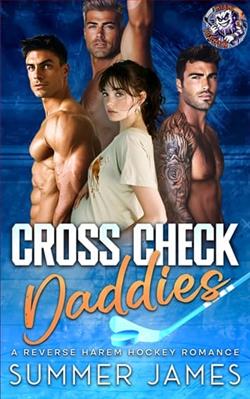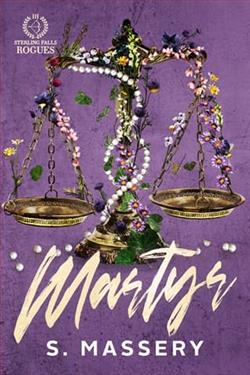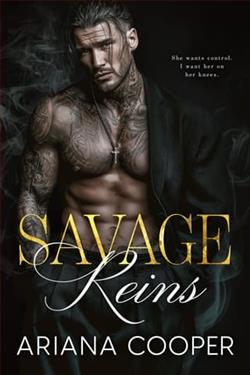Page 37 of Suzanna's Surrender
So he stood there, she thought, looking very male and ruffled in the streaming sun, the charming rockery at his feet and his rough, clever hands stuffed in his pockets. Thank me and I’ll snarl, he seemed to say.
It was then, facing him on the rocky slope, that she realized what she had refused to admit in his arms. What she had insisted was only passion and need. She loved him. Not just for the hot-blooded kisses or the demanding hands. But for the man beneath. The man who would run a careless hand over her son’s hair or answer her little girl’s incessant questions. The man who would leave paint splattered on the floor in memory of his grandfather.
The one who would plant flowers for her while she slept.
As she continued to stare, Holt shifted uncomfortably. “Look, if you’re going to faint again, I’m going to leave you where you fall. I haven’t got time to play nursemaid.”
A smile moved slowly, beautifully over her face, confusing him. She loved him for that, too—that snapping impatience that covered the compassion. She would need time to think, of course. Time to adjust. But for now, for this moment, she could simply hold tight to this rush of feeling and be content.
“You did a good job.”
He glanced back at the flowers, certain he’d rather cut out his tongue than admit how much he’d enjoyed the work. “You stick them in and cover them up.” He moved his shoulders in dismissal. “I put the tools and stuff in the truck. I’ve got to go.”
“I put the Bryce job off until Monday. Tomorrow—I have to be home tomorrow.”
“All right. See you later.”
As he walked off to his car, Suzanna knelt down to touch the fragile new blooms.
In the cottage near the water, the man who called himself Marshall completed a thorough search. He found a few things of minor interest. The ex-cop liked to read and didn’t cook. There were shelves of well-worn books in the bedroom and only a few scattered supplies in the kitchen. He kept his medals in a box tossed in the bottom of a drawer, and a loaded.32 at the ready in the nightstand.
After rifling through a desk, Marshall discovered that Christian’s grandson had made a few shrewd investments. He found it amusing that a former Vice cop had had the sense to create a tidy nest egg. He also found it interesting that training had caused Holt to write up a detailed report on everything he knew about the Calhoun emeralds.
His temper threatened as he read of the interview with the former servant—the servant that Maxwell Quartermain had located. That grated. Quartermain should have been working for him. Or he should have been dead. Marshall was tempted to wreck the place, to toss furniture, to break lamps. To give in to an orgy of destruction.
But he forced himself to stay calm. He didn’t want to tip his hand. Not yet. Perhaps he hadn’t found anything particularly enlightening, but he knew as much as the Calhouns did.
Very carefully, he put the papers back in place, shut the drawers. The dog was beginning to bark out in the yard. He detested dogs. Sneering at the sound, he rubbed at the scar on his leg where the little Calhoun mutt had bitten him. They would have to pay for that. They would all have to pay.
And so they would, he thought. When he had the emeralds.
He left the cottage precisely as he had found it.
I will not write of the winter. That is not a memory I wish to relive. But I did not leave the island. Could not leave it. She was never out of my mind in those months. In the spring, she remained with me. In my dreams.
And then, it was summer.
It isn’t possible for me to write how I felt when I saw her running to me. I could paint it, but I could never find the words. I haunted those cliffs, waiting for her, hoping for her. It had become easy to convince myself that it would be enough just to see her, just to speak with her again. If she would only walk down the slope, through the wildflowers, and sit on the rocks with me.
Then all at once, she was calling my name, running, her eyes so filled with joy. She was in my arms, her mouth on mine. And I knew she had suffered as I had suffered. She loved as I loved.
We both knew it was madness. Perhaps I could have been stronger, could have convinced her to go and leave me. But something had changed in her over the winter. No longer would she be content with only emptiness, as I learned her marriage was for her. Her children, so dear to her, could not forge a bond between her and the husband who wanted only obedience and duty. Yet I could not allow her to give herself to me, to take the step that could cause her guilt or shame or regret.
So we met, day after day on the cliffs, in all innocence. To talk and laugh, to pretend the summer was endless. Sometimes she brought the children, and it was almost as if we were a family. It was reckless, but somehow we didn’t believe anything could touch us while we stood, cupped between sky and sea, with the peaks of the house far up at our backs.
We were happy with what we had. There have been no happier days in my life before or since. Love like that has no beginning or end. It has no right or wrong. In those bright summer days, she was not another man’s wife. She was mine.
A lifetime later, I sit here in this aging body and look out at the water. Her face, her voice, come so clearly to me.
She smiled. “I used to dream of being in love.”
I had taken the pins from her hair so that my hands could lose themselves in it. A small, precious pleasure. “Do you still?”
“Now I don’t have to.” She bent toward me, to touch her lips to mine. “I’ll never have to dream again. Only wish.”
I took her hand to kiss it, and we watched an eagle soar. “There’s a ball tonight. I’ll wish you were there, to waltz with me.”
I got to my feet, drew her to hers and began to dance with her through the wild roses. “Tell me what you’ll wear, so I can see you.”















